Why Signal Is My Default Messaging App (And Why It Should Be Yours, Too)
A quiet, powerful upgrade for entrepreneurs who want more focus, less noise, and total control over their communication.
I’ve loved Signal for years. It’s fast, clean, genuinely private—and unlike most apps, it doesn’t constantly try to monetize your attention.
But for the longest time, it felt like a secret only my tech friends and I shared.
That’s starting to change.
In the last year or so, I’ve noticed more people downloading it. People outside of tech. People who care about privacy, but also just want a solid messaging app that isn’t owned by an ad company. Signal’s going mainstream. Not because it’s trendy, but because it’s better.
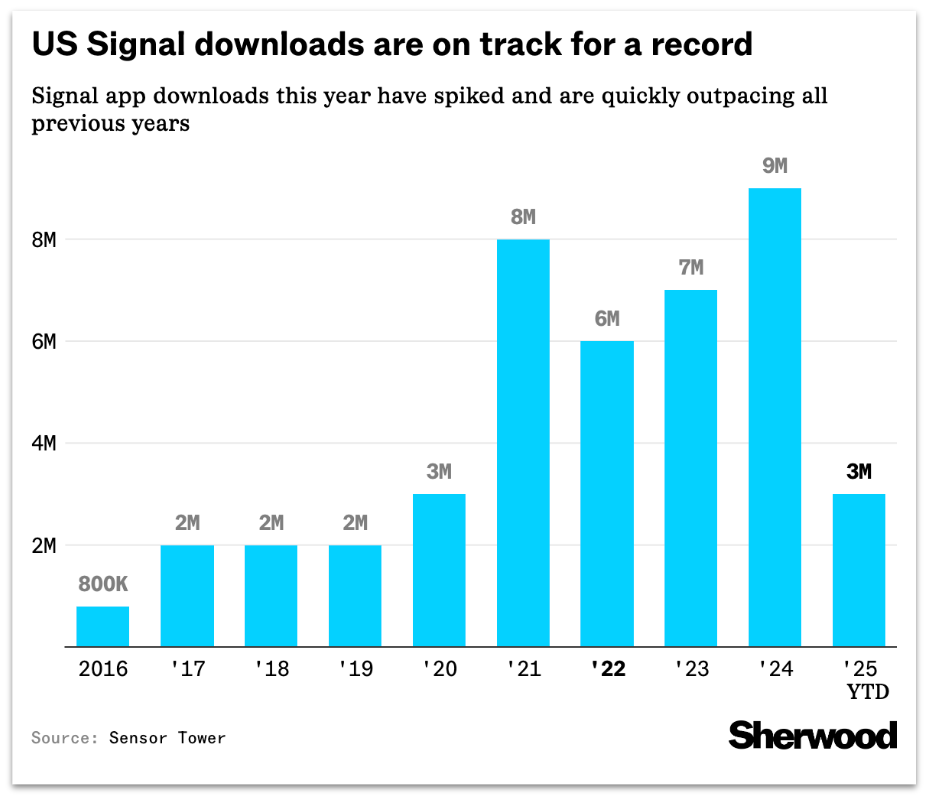
And with the political climate growing more chaotic and surveillance creeping into more corners of our lives, privacy doesn’t feel like a fringe concern anymore. It feels essential.
If you’ve ever wanted a messaging app that puts you first (your data, your time, your peace of mind) Signal is worth a closer look.
The Problem With “Normal” Messaging Apps
Most messaging apps aren’t private, they just pretend to be. Apps like iMessage, WhatsApp, and Facebook Messenger make you feel secure, but behind the scenes, your conversations fuel a much bigger machine. One that’s designed to extract value from your data, not protect it.
Encryption, But Only When It’s Convenient
A lot of messaging apps talk a big game about privacy, but dig a little deeper, and the protections start to fall apart.
iMessage encrypts messages, but only if both people are using Apple devices. Text an Android user, and your messages fall back to unencrypted SMS.
WhatsApp uses the Signal Protocol for end-to-end encryption, but it’s owned by Meta, a company whose entire business model is built on collecting data and monetizing behavior. That should give anyone pause.
Then there’s Telegram, which is often marketed as a private alternative—but here’s the catch: Telegram does not use end-to-end encryption by default. Regular chats and group messages are stored on Telegram’s servers and can be accessed by the company. End-to-end encryption is only available in “Secret Chats”—and only for one-on-one conversations you manually opt into.
Even apps that claim to be secure often leave out critical pieces:
Unencrypted cloud backups.
Metadata leaks (who you’re messaging, when, how often).
Closed-source code that can’t be independently verified.
It’s easy to think you’re using a private app—until you realize you’re just getting privacy-themed messaging with plenty of loopholes.
WhatsApp Is Closed Source (And That’s a Problem)
While WhatsApp claims to use end-to-end encryption, its app code is not open source. That means we can’t independently verify whether the implementation matches what they say it does, or whether any backdoors exist. In fact, Meta (its parent company) could modify the app at any time via an update without public scrutiny.
Security experts widely agree: transparency is essential for trust.1 With Meta’s track record on data privacy,2 that’s a big ask.
WhatsApp Is Already Eroding Your Privacy
A recent report from Wired3 reveals that WhatsApp is introducing new cloud-based AI features using Private Processing, including message summarization and composition tools. Private Processing is like a box that lets AI helpers work on your messages without WhatsApp or anyone else seeing them. It's like sending your message to a super-secret helper station, where the AI does its job and then sends it back, all without anyone peeking inside the box.
While private processing is designed to preserve end-to-end encryption and prevent Meta from accessing the content of user messages, some experts, like Johns Hopkins cryptographer Matt Green, express caution.
“Any end-to-end encrypted system that uses off-device AI inference is going to be riskier than a pure end to end system. You’re sending data to a computer in a data center, and that machine sees your private texts…More private data will go off device, and the machines that process this data will be a target for hackers and nation state adversaries.” – Matt Green, Johns Hopkins cryptographer.4
You’re the Product, Not the Customer
Most messaging platforms are owned by advertising-driven giants—Meta, Google, Apple—who don’t make money from messaging. They make it from data, and messaging apps are just another funnel for collecting it. Even if they can’t read your texts, they can track your activity, scan attachments, and analyze behavior to improve ad targeting across their ecosystem.
Metadata Reveals More Than You Think
Even when your messages are encrypted, apps still collect metadata:
Who you’re talking to.
How often.
What time.
From where.
On what device.
Over time, this builds a surprisingly detailed picture of your relationships, habits, and emotional patterns. Encryption alone doesn’t protect you from that kind of profiling.
The Illusion of Convenience Comes at a Cost
It’s easy to keep using whatever app your friends are on. But that convenience creates lock-in: a kind of invisible trap where switching feels impossible because everyone is already there. You don’t stay because it’s the best option. You stay because it’s the default.
And that lock-in keeps feeding the same surveillance economy that erodes your privacy elsewhere. What feels easy in the moment can be surprisingly costly long-term—draining your attention, harvesting your data, and slowly chipping away at your ability to choose something better.
Bottom line: If an app is “free” and owned by Big Tech, your data is probably paying the bill.
What Makes Signal Different
Signal is the only messaging app I trust—because it’s built for privacy, not profit.
Unlike mainstream messengers, Signal doesn’t just promise encryption. It actually delivers on it, without collecting your data, showing you ads, or tracking your behavior.
Encryption That Actually Protects You
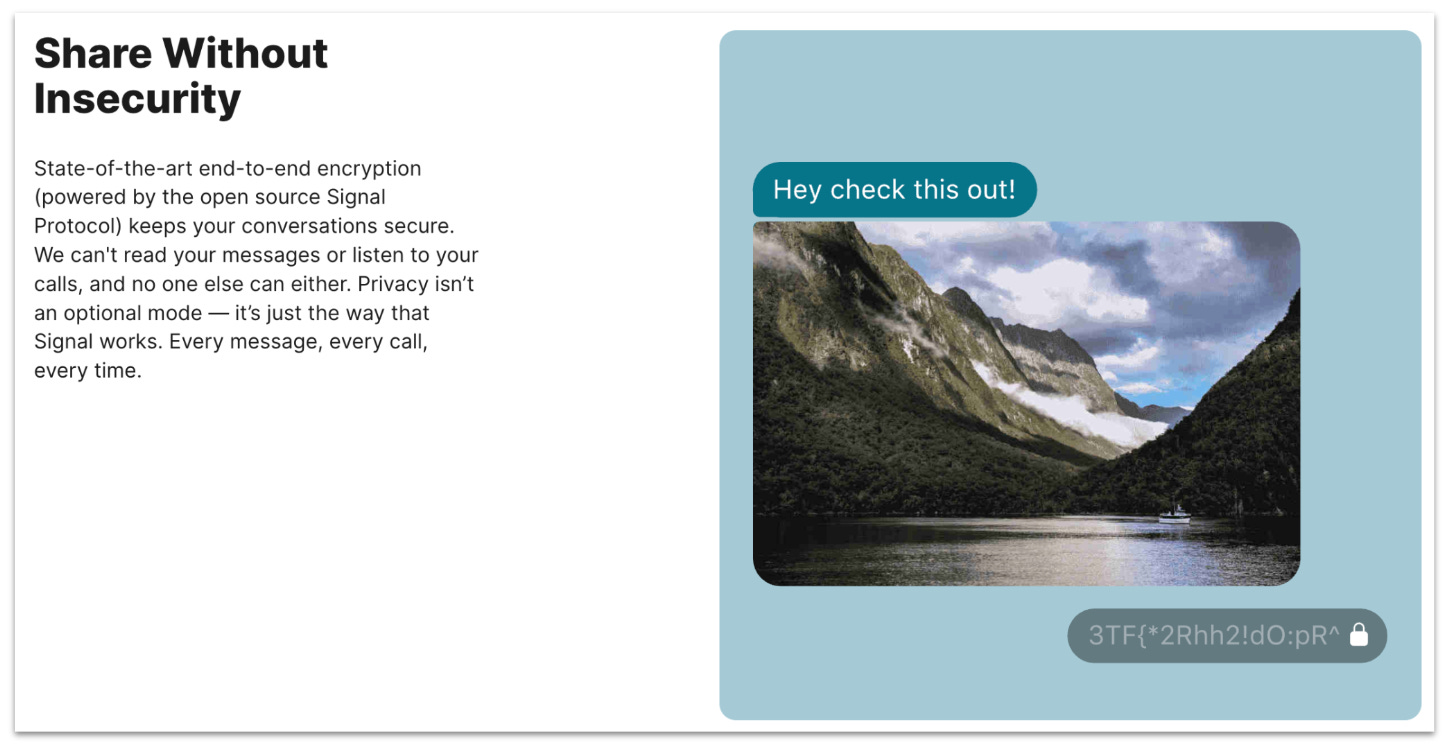
Most messaging apps say they’re “secure,” but that often just means your messages are encrypted some of the time or under specific conditions. Signal offers end-to-end encryption by default for every message, call, photo, and group chat. No settings to toggle. No fine print. Not even Signal itself can access what you send.
No Metadata. No Profiling. No Surveillance.
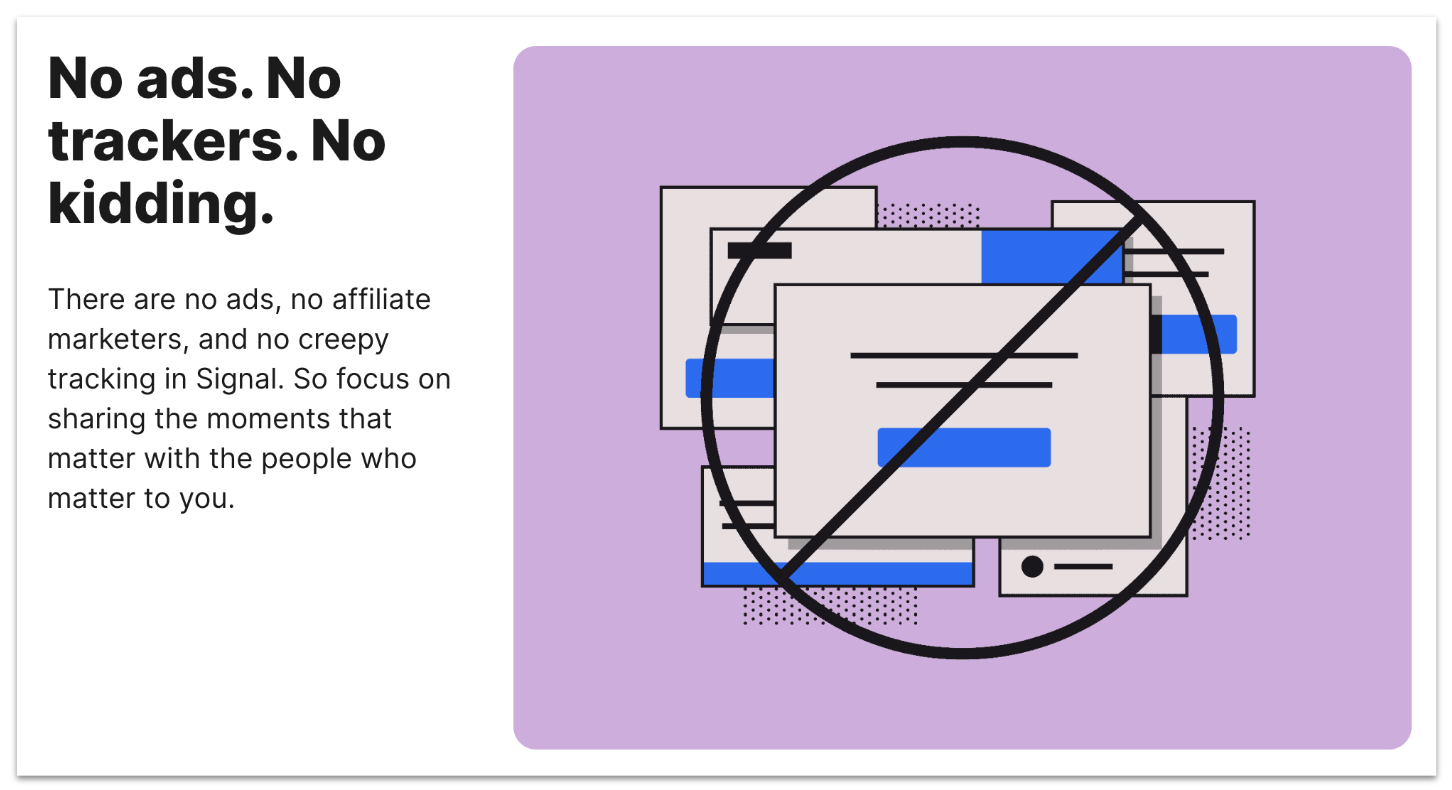
Encryption hides what you say, but metadata reveals who you talk to, when, and how often. Signal is one of the only apps that doesn’t collect this information. It uses advanced techniques like sealed sender5 and contact discovery hashing6 to protect even the invisible parts of your communication.
Translation: Signal doesn’t just keep your messages private. It hides the fact you’re even messaging at all.
Open Source and Peer-Reviewed
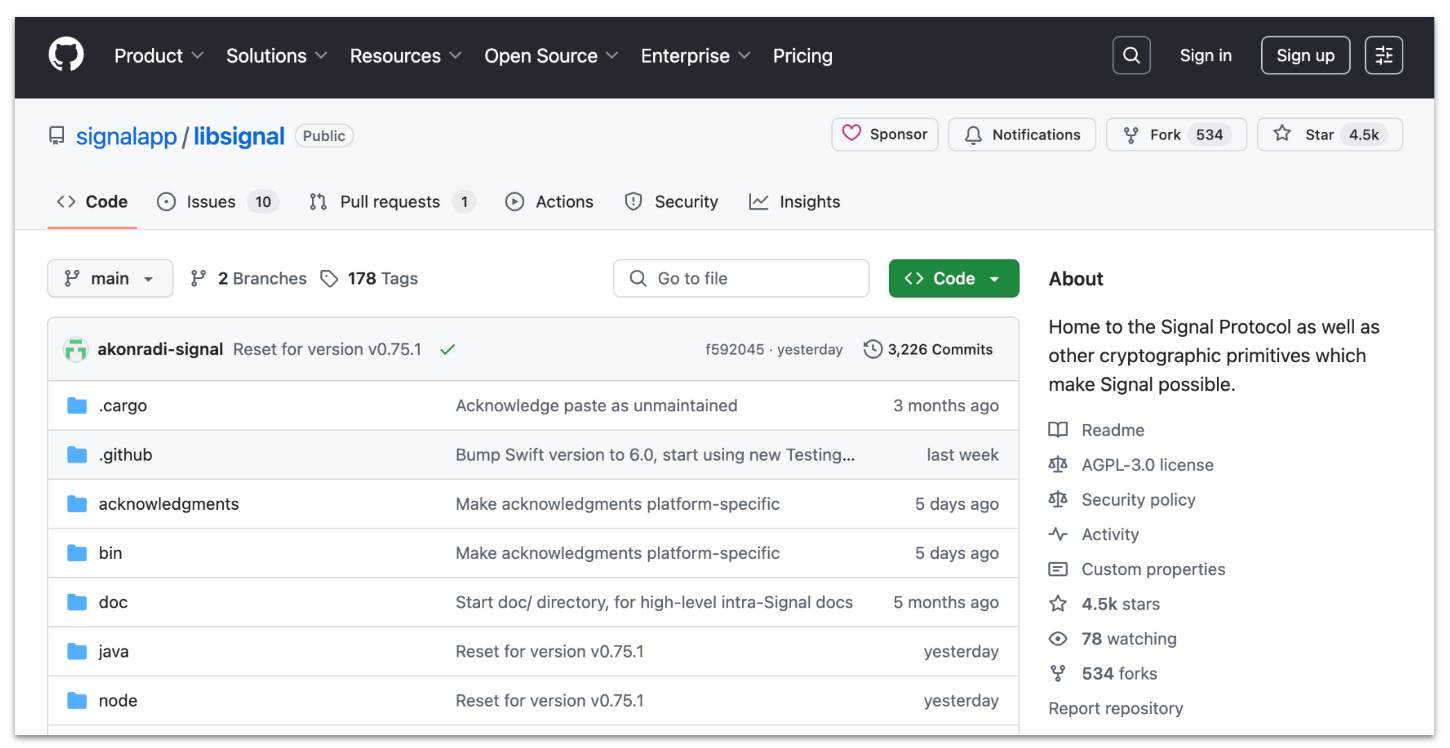
Unlike big tech platforms that operate behind closed doors, Signal’s code is fully open source. Anyone can audit it. And many do—especially security researchers. This transparency is a huge trust signal (no pun intended) and a core reason the app is considered the gold standard in secure communication.
Funded by Donations, Not Data
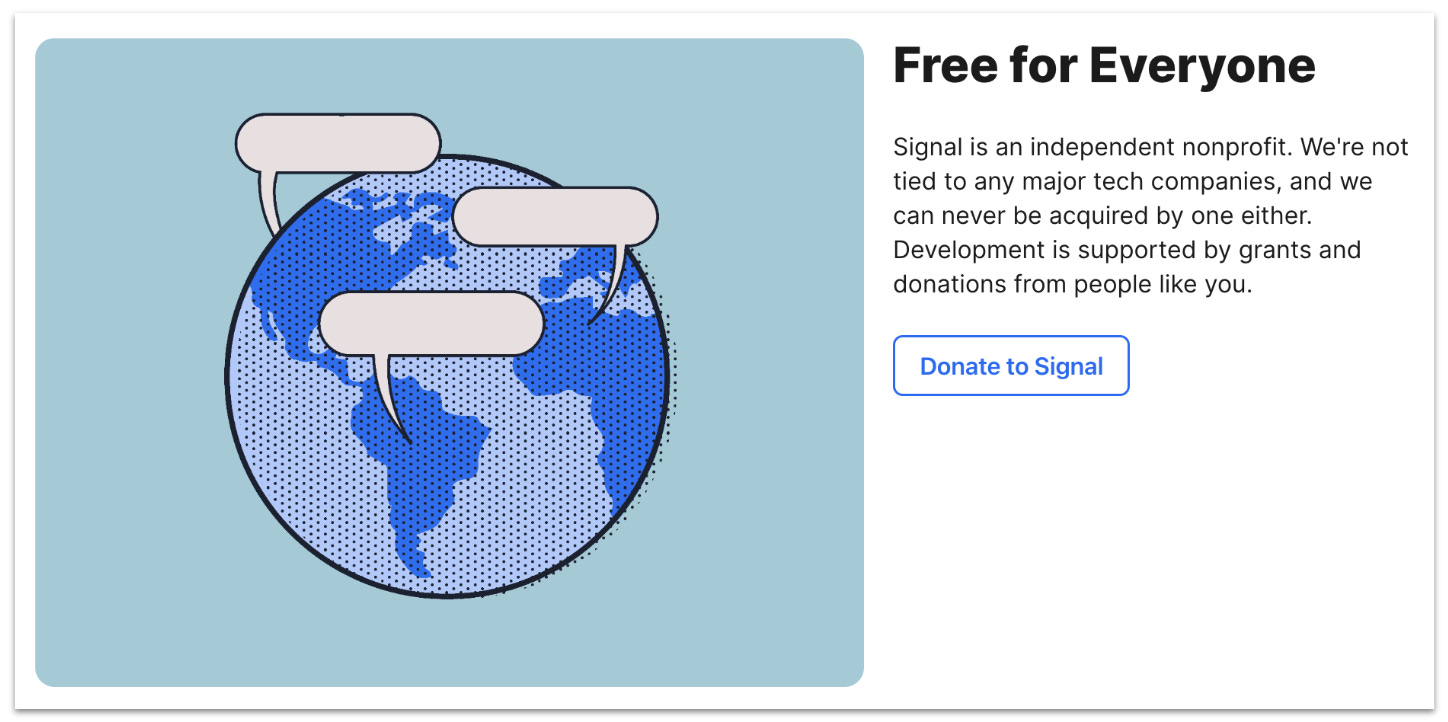
Signal is run by a nonprofit foundation, not a venture-backed corporation. That means it has no incentive to show you ads, sell your information, or “pivot to engagement.” Its only mission is to protect privacy and promote free expression. No dark patterns. No growth hacks. Just values, encoded into the product.
Signal Has Everything You Need, Nothing You Don’t
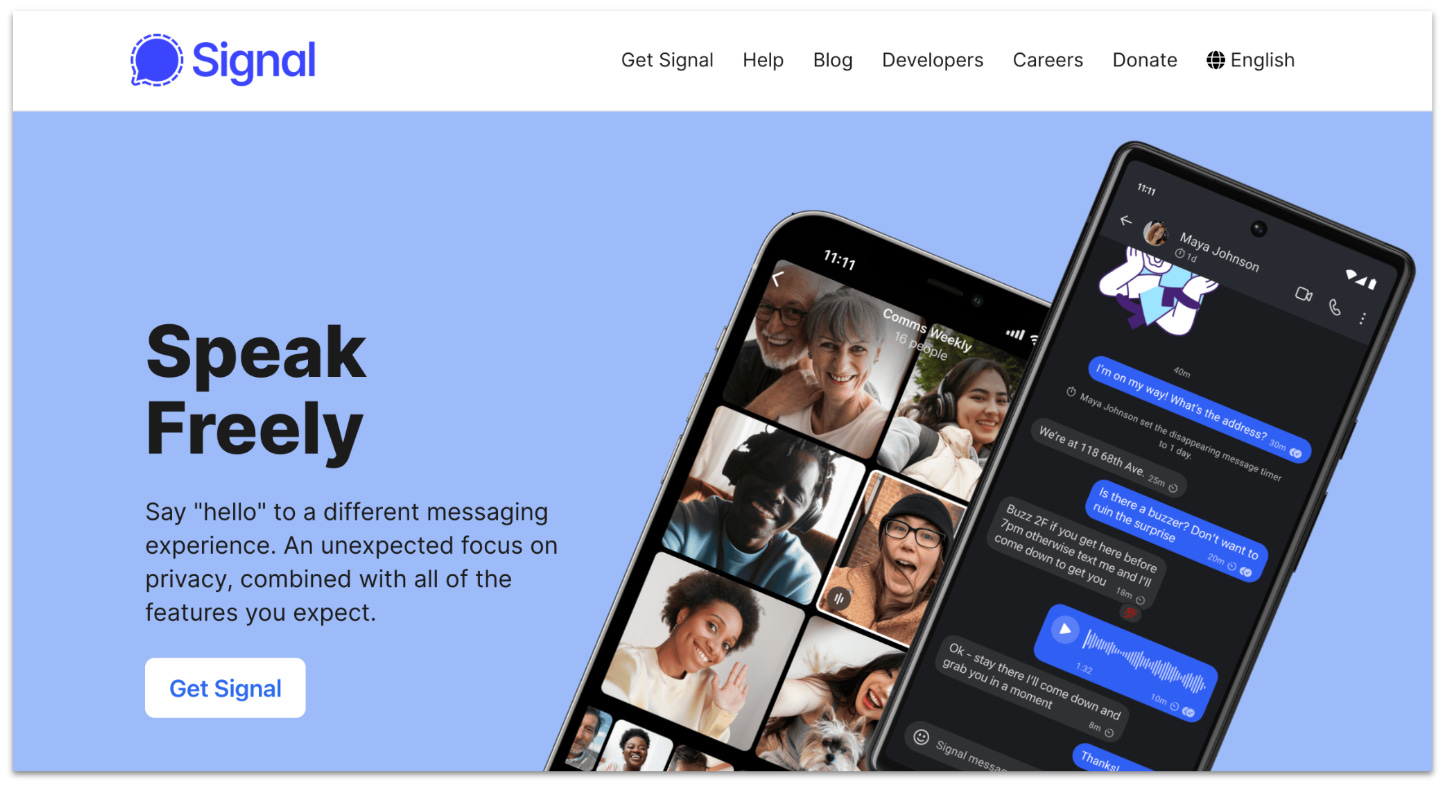
Signal isn’t just a privacy upgrade; it’s also just my favorite messaging app period.
There’s a myth that privacy-first tools are clunky or limited. But Signal punches way above its weight when it comes to everyday features. If you’re used to WhatsApp, iMessage, or even Telegram, you’ll feel right at home.
A Clean, Modern UI That Just Works
Signal’s interface is fast, minimal, and refreshingly free of clutter. No ads, no endless menus, no creepy algorithm nudging you to “engage.” It looks and feels like a premium app—because it is. The design puts your conversations front and center, while staying out of the way.
Seamless Across All Your Devices
Signal works effortlessly on iPhone, iPad, Mac, Android, Windows, and Linux. Your messages stay synced across devices with end-to-end encryption intact. That means you can start a chat on your phone and pick it up later on your laptop, without compromising security or usability.
No weird iCloud syncing. No proprietary lock-in. Just private messaging, everywhere you need it.
Voice Notes Done Right
Signal’s voice messaging is smooth, responsive, and crystal-clear. You can preview before sending, swipe to cancel, and listen at different speeds. For people who prefer talking over typing, it’s one of the best implementations out there.
Great Media Sharing with Built-In Privacy
Send photos, videos, GIFs, or documents, just like any other messaging app. But Signal adds thoughtful extras:
Blur faces automatically in photos. (Signal detects faces in images and lets you obscure them with a tap—ideal for protecting people’s identities, especially in sensitive contexts).
View-once media (auto-deletes after being viewed).
Encrypted media backups (optional).
Group Chats Without the Chaos
Signal supports fully encrypted group chats with admin controls, mentions, disappearing messages, and pinned messages. You can even set a group link to invite people easily without needing to share your number.
Emoji Reactions and Custom Stickers
Yes, you can react to messages with emojis. Yes, there are sticker packs. Yes, you can install your own. Signal is just as expressive as the apps you’re used to, without feeding every interaction into a database.
Disappearing Messages and Privacy Tweaks
Want your messages to vanish after an hour? Or a week? You choose the self-destruct timer for each conversation. You can also enable:
Screen security (blocks screenshots).
Incognito keyboard mode.
Registration lock for extra account security.
Notifications Respect Your Space
Signal lets you customize notifications per chat, mute threads, or even hide message previews completely. You’re in control of how and when you get pinged.
In a World of Noise, Signal Is Peaceful
Typing indicators? Read receipts? Signal gives you full control. You can leave them on if you want—or turn them off completely. Same with “last seen” timestamps (which Signal doesn’t show at all). That means you can message without the pressure of feeling constantly observed.
No feed, no algorithm, no digital FOMO. Just private conversations, on your own terms.
Bottom line: Switching to Signal feels like a breath of fresh air.
Switching your messaging app is one of the simplest, highest-impact privacy moves you can make.
Signal doesn’t just protect your data, it respects your attention, your relationships, and your autonomy. It gives you modern features without creepy tradeoffs. It works beautifully across devices. And it’s backed by a nonprofit, not an ad empire.
Most people won’t switch unless someone shows them a better way. So this is me, showing you. Signal is the better way.
Give it a try. Use it for a week. Invite a few friends. See how it feels to message without being mined. You might be surprised at how good quiet can feel.
To endless possibilities,
Casandra



Wow! I’m so glad I saw this! I’ve used both signal and telegram but will now choose signal over any others.
Thank you.